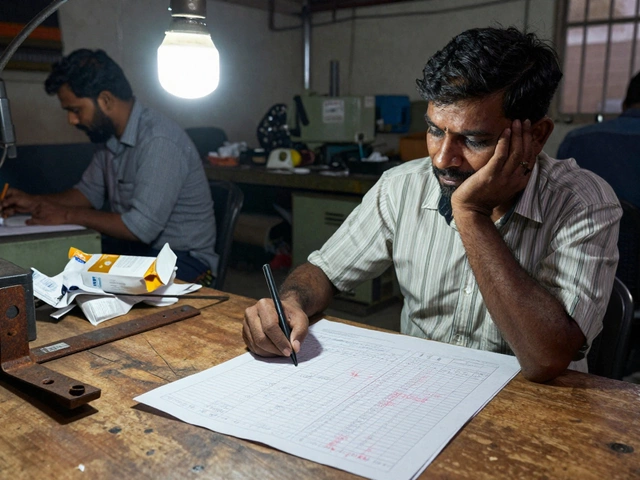India's pharma industry isn't just huge—it's a global lifeline. About 40% of the generic drugs used in the US come from Indian manufacturers. Sounds impressive, right? But behind the numbers, there's a problem that's tough to ignore: keeping up with the world's strictest drug quality standards.
Every other week, there's news of another warning letter from the USFDA or another shipment held at the border. It's not just paperwork—these warnings mean rejections, expensive recalls, and a real dent in India's reputation as the 'pharmacy of the world.' At the core, it's about quality, trust, and the crazy pace of change in international regulations. Miss one tiny thing in the manufacturing process, and the whole batch could be tossed.
If you run or work with a pharma company in India, you already know that meeting not just Indian but also EU or US standards is a never-ending hustle. It's not just about fancy new equipment or a shiny factory. We're talking data transparency, airtight documentation, automated systems, and ongoing staff training. And let’s be honest: not all companies have the cash or the mindset to keep up.
- Caught in the Crosshairs of Global Regulators
- The Hidden Cost of Quality Issues
- Data Integrity: Still the Achilles' Heel
- Where Do Indian Pharma Players Go From Here?
Caught in the Crosshairs of Global Regulators
It’s no secret that Indian pharma manufacturers are under the microscope like never before. The biggest buyers—think USFDA, EMA, and even some African and Southeast Asian regulators—have turned up the heat. In the last five years, the USFDA ramped up the number of both scheduled and surprise audits in India, sometimes multiple times in a single year for bigger sites.
Here's a hard truth: In 2023 alone, more than 25 Indian pharma plants got USFDA warning letters. The main issues? Data gaps, incomplete quality checks, and, sometimes, just plain poor recordkeeping. Once the USFDA issues a warning, manufacturers can't export to the US until they've fixed every little thing, and that process can drag on for months—or even years.
| Year | No. of USFDA Warning Letters (India) | Major Issues Noted |
|---|---|---|
| 2021 | 14 | Data Integrity, Hygiene |
| 2022 | 19 | Documentation, Quality Controls |
| 2023 | 27 | Data, Process Validation |
Almost every big name in Indian pharma—from Sun Pharma to Lupin—has faced this. And for smaller players, a single misstep can push them out of lucrative markets. It’s not just about ticking boxes. These regulators want to actually see, in real time, that every drug is top quality, every single time. If just one chemist forgets to sign off a document or one batch has missing data, everything comes crashing down.
Tips for staying out of trouble? Get proactive about compliance. A few ways Indian pharma manufacturers can minimize risk:
- Run regular mock audits. Don't wait for a regulator to show up—identify gaps before someone else points them out.
- Invest in digital batch records and quality management systems. Manual paperwork gets messy and invites mistakes.
- Keep staff trained and updated on international requirements. The rules change fast—so should your team’s knowledge.
- Don't ignore even small compliance lapses. Regulators don’t—so fix the tiniest problem before it grows.
Indian pharma has the scale and expertise to keep leading the world, but only if they treat global regulatory pressure as a fact of life—not just a hiccup that’ll pass.
The Hidden Cost of Quality Issues
When you hear about quality issues at Indian pharma manufacturers, think beyond just batch recalls or a slap on the wrist from a regulator. These problems hit hard, both in lost business and in huge repair bills. A single warning letter from the USFDA can cause companies to lose access to big markets like the US and Europe for years. For some, that's half their international revenue wiped out overnight.
Here’s something that doesn't make headlines enough: every time a shipment is rejected or a plant is flagged, costs go up—sometimes by crores. You get stuck paying legal fees, fixing production lines, retraining workers, and sending managers overseas to do damage control. And don’t forget future deals that collapse just because your company’s name shows up on a watchlist.
Let’s look at some real numbers. In 2023, Indian pharma exports to the US dropped by around 5% after a spike in quality-related import alerts. It’s not just the big names getting hit; smaller manufacturers feel the pinch even more, as they have less cushion to fall back on.
Here's the breakdown of direct and indirect costs when quality slips:
- Product recalls: These often cost crores per incident, plus shipping and disposal.
- Remediation expenses: Upgrading plants and systems eats up capital fast.
- Loss of reputation: Harder to win tenders or negotiate with overseas clients.
- Legal costs: Defending your company in foreign courts is never cheap.
- Operational downtime: Lines sit idle while fixes happen, which means staff and machinery are still burning money but generating zero return.
Investing in systems to prevent these messes—like better staff training, stronger documentation, or automated compliance checks—usually costs less than dealing with the fallout. When you do the math, staying ahead with quality saves more cash, and your brand doesn't take a hit.

Data Integrity: Still the Achilles' Heel
If there’s one thing that keeps Indian pharma manufacturers awake at night, it’s data integrity. Regulators like the USFDA and EMA have been hammering home this point for years, and for good reason—one weak spot in records can throw an entire batch of drugs into question. In 2023, over 60% of USFDA warning letters to Indian pharma companies cited data integrity issues. That’s a clear signal that this isn't just nitpicking—it's a major red flag for patient safety and business survival.
Here’s where things get tricky. Data integrity isn’t just about not faking numbers or results. It’s about making sure every record—whether it's handwritten lab results or a printout from a fancy machine—matches up, is secure, and can be tracked any time someone asks. If a record is missing or changed without explanation, it shatters trust with regulators and customers.
“Without reliable data, you have no product. You only have a guessing game, and that’s not how you run a pharmaceutical business.” – Dr. Ravi Gupta, former quality director at a leading Indian pharma firm
Let’s break down where Indian pharma manufacturers often stumble:
- Editing lab data without leaving a clear trail or explanation.
- Poor user controls—lab staff can sometimes access or change records meant only for supervisors.
- Paper records going missing or not matching digital files.
- No regular audits to catch accidental or intentional misreporting.
| Issue | % of Letters |
|---|---|
| Data Integrity Failures | 62% |
| Sanitation Problems | 18% |
| Other Quality Issues | 20% |
So, what actually helps? A few proven steps make a big difference:
- Use digital systems with login controls—no more shared passwords or generic logins.
- Automate recordkeeping to minimize human error and spot changes fast.
- Train staff regularly; even a simple refresher on why data integrity matters works wonders.
- Set up random audits—these are a pain, but they catch small mistakes before they become big scandals.
The message is clear for any Indian pharma manufacturer hoping to export to regulated markets: sort out data integrity or get ready for some serious roadblocks. It isn’t sexy, but it’s non-negotiable if you’re playing in the global leagues.
Where Do Indian Pharma Players Go From Here?
So what’s the playbook for Indian pharma manufacturers now? The old days—where you could get by just ticking some boxes—are done. Companies that want to stay in the game really only have two options: adapt fast or risk being shown the door in global markets.
Step one? Get serious about quality. This means way more than a few compliance documents. Factories need to invest in modern equipment and automated monitoring. It isn’t just about buying new machines; it’s about tracking every batch and knowing you can prove it if auditors come knocking. For example, the US Food and Drug Administration (USFDA) rejected over 25 shipments from India just between January and March 2024 due to documentation and quality issues. Those numbers sting—and they’re a hint for everyone else to step up.
Another big move: put skilled people in charge. It’s not enough to train workers every few months with old PowerPoints. Bringing in experts to run audits, fix gaps, and coach staff on best practices has become non-negotiable. A lot of companies are now tying up with global consultants to close that skill gap.
Digital transformation is more than just a buzzword here. Smart systems—think real-time quality data, dashboards, and automated alerts—can catch small mistakes before they become disasters. Companies rolling out these tools cut compliance headaches and save cash in the long run.
| Step | Impact |
|---|---|
| Automate Batch Tracking | Improves traceability, speeds up recalls, boosts trust |
| Continuous Training for Staff | Cuts human errors, passes more inspections |
| Hire Quality Experts | Fixes gaps fast, matches global expectations |
Sure, these changes add short-term costs. But the alternative—lost exports, stricter audits, and a battered reputation—isn’t an option. Indian pharma manufacturers who own up to quality, data transparency, and global compliance norms are the ones who will stay in the big leagues. The rules of the game aren’t changing anytime soon, so getting ahead is the only real choice left.






